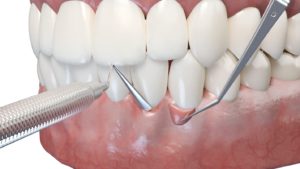
If periodontitis has seriously damaged your gum tissue, it may have receded to the point where your tooth roots are exposed. In such instances, it is common for a periodontist to recommend gum graft surgery. The procedure might sound a little intimidating, but thankfully, it is more comfortable than most people anticipate. Let’s talk about what you can expect to feel during and after this type of gum disease therapy.
During the Surgery
Your periodontist wants you to be comfortable, so your mouth will be numbed with local anesthesia during your gum graft surgery. Local anesthesia prevents you from feeling pain, but it does not block out sensations of pressure, so you might feel some movement in your mouth as your dental team works.
Most patients also qualify for sedation. Sedatives induce a powerful feeling of calm and relaxation. Many patients who use them do not remember anything about their surgery after it is over.
After the Surgery
Once any sedation and local anesthesia begin to wear off (usually a few hours after the gum graft surgery), you can expect to feel some discomfort. Your gums are likely to be swollen and tender. You may need some pain medications (either prescription or over-the-counter) to help you remain comfortable during the initial part of your recovery period.
Tips for a Smooth Recovery
You may not be able to eliminate all discomfort associated with gum graft surgery. However, there are things you can do to facilitate a smooth recovery and reduce your risk of painful complications. You should:
- Rest for at least a full day after your surgery. Most patients are able to return to work and light physical activity within a few days of their procedure.
- Do not touch your surgical site. You should not pull your lips to view the surgical site, nor should you attempt to remove the dressing. You should also not brush near the grafting area for about one month (but you will be able to brush the rest of your mouth after the first 24 hours of your recovery period).
- Be careful about what you eat. Extremely hot foods and beverages should be avoided for at least a few days. During the first week of your recovery, you should stick to a diet that consists of liquids and extremely soft foods.
- Keep in touch with your periodontist. If you run into any questions or concerns during your recovery, feel free to get in touch with the team who performed your procedure. They want you to heal as efficiently and comfortably as possible!
Gum graft surgery can cause some discomfort, but it can be an important part of your recovery from severe gum disease. Plus, most patients are feeling normal within just a few weeks of their procedure!
Meet the Practice
The two periodontists in our practice have several decades of combined experience. They use their expertise along with advanced technology to perform a range of treatments, including gum grafts. If you would like to schedule a consultation with our team or learn more about how we may be able to serve you, contact us at 508-753-5444.

